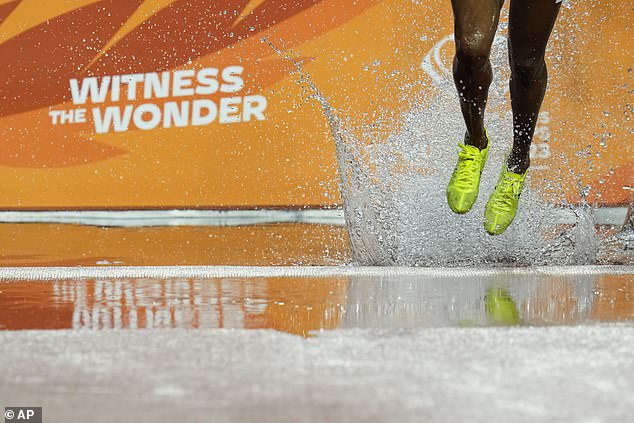Transgender athletes are STILL being allowed to run in UK women’s races, six months after being banned, through a loophole in the rules… as rival runners ‘fear death threats’ if they speak out
- The effectiveness of UK Athletics’ strict measures have been questioned
- There is a ban on trans women competing in the female categories of any event
- This was violated when a team with a trans woman finished first in a race
Transgender athletes can still compete in the female category of British women’s racing, almost six months after a ban was introduced to prevent this.
The strict crackdown by UK Athletics was introduced in March, but a glaring loophole has now been exposed in the rules, which were put in place to ban those who have gone through male puberty from competing in women’s athletics.
As a result, the effectiveness and enforcement of the restrictions are in question.
The rules imposed a ban on trans women competing in the female category of any event under UKA’s jurisdiction. However, they also include a controversial exemption for competitions where places have already been secured.
However, they did state that those affected ‘must not accept any prize and their results will not count towards any record, qualifying time or mark, or team score’.
Transgender athletes can still compete in the female category of British women’s racing

UK Athletics – led by CEO Jack Buckner – followed World Athletics in introducing strict measures
Nevertheless, the regulations were effectively flouted when a team featuring a trans woman took first place in a running event last month.
The identity of the individual has been withheld by The Telegraph.
When contacted about the outcome of the event, the race director explained that the difference was due to an honest mistake and that he was in the process of making corrections.
He also revealed that the runner had entered the women’s category two weeks before the UKA ban came into effect. The rules were followed after the runner was excluded from the awards ceremony despite clocking the second-fastest women’s time.
The person is now listed as the second fastest woman, although her results were initially not included on the women’s list, which remains accessible online.
Rivals of the runner in question have taken advantage of UKA’s ‘transitional arrangement’, which allowed her to compete in the female category until December.
“This is the unfairness of it all,” a rival of the team wrongly awarded first place told The Telegraph. ‘I want to talk about it – and I really do. I know people have had death threats (online from pro-transgender lobbyists).”

The effectiveness and enforcement of the restrictions have now been questioned
She then added, “I have to be careful about my safety. It sounds very trivial, but it is actually very frustrating because I work hard and aim to be in the top 100 nationally in my age group for women.
“How many other male-to-female transgender people are classified in these results?
‘I train very hard. I do 15 hours of running and training a week. I can’t compete with someone who is a man. And sometimes you think, “Why should I bother?”
She insisted she had no personal grudge against the transgender runner.
Contacted by The Telegraph, governing body England Athletics said it was “highly unlikely” that a transgender woman’s results would affect a rival’s Masters selection and pointed to “processes put in place to check eligibility.”
Meanwhile, UKA has acknowledged that ‘extended registration periods’ for events mean transitional arrangements could impact the sport for a longer period of time.
